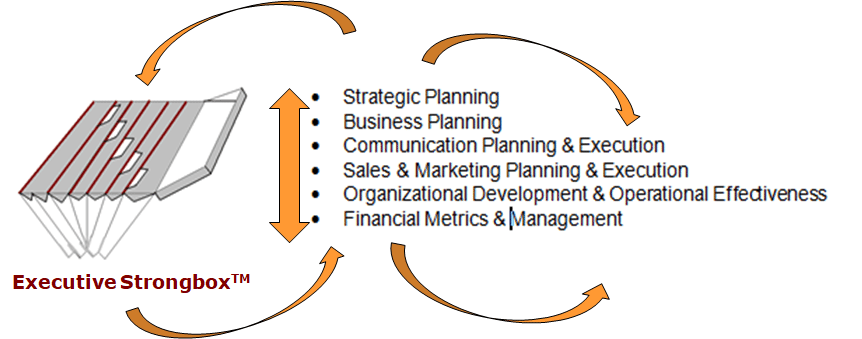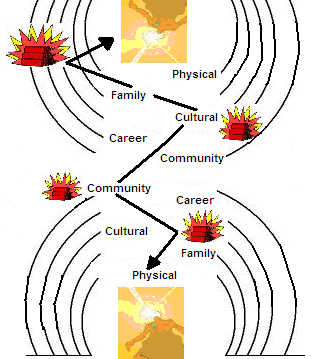Rule #4: Push Courage
Strong Point’s Leadership Rule #4: Push Courage
I can’t lay claim to the phrase “Push Courage.” It comes from my own life, from my sister-in-law who espouses this mantra every time she hears a hint of uncertainty or timidity in my voice or anyone else’s. My sister-in-law Christina, knows a lot about courage. She has a rare bone disease that somehow caused her bones to fracture and break every time they should have been expanding and growing. Her health and life were so compromised by her disease, that at the age of 3, doctors told her parents not to expect her to live past the age of 9. Today at 67 years old, her body is still the same size of her three-year-old self. Her spirit, on the other hand, is as large as the universe itself. Her entire life is a testament to the force of courage. Christina is well educated and literally gets around by army-crawling with elbow shields. She traverses the universe with the strength of her arms and the force of her spirit. She drives independently and has used her heart and mobility to teach and mentor anyone who needs a lesson in courage. Her spiritual, emotional and intellectual strength, I liken to Stephen Hawking’s. In either case, you cannot deny what courage can bring to a person’s life, even when they are faced with the most severe human limitations.
The business of Strong Point Strategy lies in the work of strengthening companies. We work with business leaders and teams to help them advance and grow. We use two distinct business disciplines: Business Development and Leadership Development, and our own methodologies centered on these two disciplines, to do this work. Strong Point applies unique ways of working, methods and tools to operationalize and realize business results from strategic objectives. Courage is core to Strong Point’s leadership methods and work. The phrase Push Courage, as Christina has taught me, denotes that courage is a force that has to be marshaled, mustered, conjured-up and called into action often, if not continuously, to get work done and realize results envisioned. Courage is required to push past our human weaknesses; on all the dimensions they challenge us.
Strong Point’s methodology for business development is entrepreneurial at its core, and born out of a long history of helping companies start-up and grow. Strong Point has a simple six-step repeatable process that can be used to teach, build and master the skills needed to develop a strong business foundation. The dynamic application of this same six-step process can be used to sustain growth by continuously building upon that foundation to operationalize growth strategies and realize intended results.

It takes great courage to start a new business and to learn, build and master the portfolio of skills needed to sustain it. If you’ve tried a run at entrepreneurship, you can attest to the fact that business start-ups can challenge you in all areas of your life. One sure outcome of working with or for a business start-up, is that you’ll be challenged, spiritually, financially, professionally, intellectually, relationally and emotionally. Entrepreneurship is a full-contact sport.
Earlier this year (Feb 16, 2017), Michael Reitblat wrote an article for The Entrepreneur’s Insider Network, which is an online community meant to share start-up insights, called “The 4 Quotes Every Entrepreneur Should Live By.” In this article, Reitblat sites the quote below, as one of those 4 vital quotes to live by:
“Success is not Final. Failure is not Fatal: It’s the Courage to continue that counts”
He also says this:
“In the end, it all comes down to this: You get knocked down and you get up again, and you keep pushing forward. If you build a resilient team that can learn fast, and adapt as fast as it learns, all you’ll need is to not give up until you figure it out.”
There it is again, that word PUSH. Push forward. Strong Point’s Leadership Rule #4: Push Courage.
Developing strong business acumen itself requires great courage. Time and energy spent educating one’s self in the areas of Strategic Planning, Market Development, Business Analysis and Architecture, Process Analysis and Improvement, Data and Information Management, Technology Systems, Applications and Tools, Organizational and Cultural Change, Business Transformation and Innovation, and so on…requires courage. Courage in this context is the day-in and day-out discipline to keep learning, to keep trying different strategies and approaches to reach a desired outcome or to simply stick with the plan you’ve developed long enough to see it through. It takes courage to keep working through undesired outcomes and results. This over and over action elevates courage to a discipline. Pushing through vast volumes of business information and an ever-growing portfolio of skills requires the resilience and sticktoitiveness reserved for leaders who have learned enough, failed enough and pushed courage enough to have something meaningful to say and to contribute. Thinking and working like an entrepreneur can help push your career, your motivation and your results, whatever the size of the organization you’re working to support.
This Rule #4, Push Courage, however, also points to another kind of courage: a deeper, more soulful, personal courage. The courage to develop business acumen, while it’s important, pales in comparison to the courage it takes to face another human being with dignity and effectiveness, especially when we don’t agree with their thoughts, actions, or approach to solving problems. Courage to develop mastery over interpersonal skills, or what Strong Point refers to as Leadership Skills is a whole other matter. Leadership Effectiveness also requires the use of a whole other set of methods, tools, and ways of working. These methods, tools and ways of working are wrapped up in Strong Point’s Leadership Development Program(s).
Learning to master the financial metrics that provide meaningful business insights, the strategic plans that drive business forward or cultural values that keep employees, partners and vendors supporting your mission is easier than learning and discerning the important motivating forces that drive individuals and teams to reach and sustain optimum performance. Learning how to perform a job-related task, or master a functional skill, is not the same thing as learning how to master your own self and your relationships with others. Working to predict team dynamics and emotions or consistently manage the complex combination of interpersonal needs, wants, skills and capabilities of a diverse, educated, multi-disciplined and multi-cultural team sometimes feelings nothing short of miraculous.
In engagement after engagement, Strong Point has learned that Leadership Development and Interpersonal Skill Development are the two core areas in organizational operating environments that have the greatest need for definition, standardization, upgrading and focused skill building. In most Strong Point engagements there is no shortage of highly-educated, impressively experienced, sought after and valued individuals. Put 7, 10, 15 or 20 of these highly educated and skilled professionals on a leadership team, or on an important collaborative initiative, and watch the talent, the productivity and the results, wane, swirl and get dangerously off-track as a result of the wide variation in relational and leadership ability among them.
It’s amazing to me, still, how often and how completely leaders and professionals fail to bring forth the courage to deliver unpleasant news gracefully; ask an important, yet potentially controversial question effectively; hold people accountable for a missed deliverable successfully; or disrupt or stop unwanted and unproductive behaviors in the moment. Time and again, I’ve seen functionally skilled experts, run slipshod over each other in the most undignified, embarrassing and hurtful ways when faced with an interpersonal challenge.
Perhaps it’s our own egos and psyches that get in the way of our leadership effectiveness. It could be the many layers of physical, familial, ethnic and professional biases we hold that squelch our courage to face others forthrightly. Fear of failure, reprisal and termination all float like dark clouds in the atmosphere of our workplace. In my mind, it’s all of these things and more that keep us from the courage we need to treat ourselves and each other with dignity, integrity, humanity and grace in a predictable and repeatable way. We cower in the face of our colleagues more than we effectively confront and conduct that difficult conversation with courage.

Herminia Ibarra in her article called The Authenticity Paradox, published in the January – February 2015 Harvard Business Review, shares her thoughts about leaders’ struggle to be courageous and authentic:
“Because negative feedback given to leaders often centers on style rather than skills or expertise, it can feel like a threat to their identity”…
“Until we see career advancement as a way of extending our reach and increasing our impact in the organization – a collective win – not just a selfish pursuit, – we have trouble…”
I personally believe that if we identify and practice basic self-awareness and interpersonal skills such as: Effective Body Language, Active Listening, Clarifying Expectations, Giving and Receiving Feedback, and Negotiating, the way we practice programming, scientific discovery and process management; our courage and confidence in facing each other will improve. When Strong Point focuses as much energy and value on Leadership Development as it does on Business Development during an engagement, the results are not just improved business results. Leadership capability increases and with increased Leadership Capability comes the immeasurable results of increased empathy, satisfaction, support and solidarity in the workforce and in the operating environment.
Here are six simple ways to be more courageous in your relationship with your colleagues right now:
Be Authentic
As much as you can, work in a way that honors your value and belief systems, even if, and especially when, they differ from others. Strike a balance between showing who you are and sharing meaningful moments, lessons, thoughts and ideas that make you unique.
Express frustration, anger and discontent with dignity and empathy
I recommend working with a psychologist, or reading books like Why Talking Is Not Enough, written by Susan Page, to find tactful ways to deliver discontent and deepen working relationships. Learn to master your own phrases like: “Perhaps this is the not most productive way we can work together”, or “This doesn’t feel like it’s complete just yet”, and “When you provided your input, I felt differently…Can we Talk about it?” How you deliver a message of frustration is as important as expressing the source of the frustration. Don’t triangulate and talk “about” your frustration to others. Have the courage to face the colleague who frustrates you.
Tell the truth
No one gains when you withhold important truths about your work. When you honestly and sincerely share what you feel, think and know, others learn more about who you are. They may come to better understand the shared work you’re doing by gaining a better understanding of your perspective. Helping others to more deeply understand your perspective, may also help them better understand the problem you are both trying to solve. Telling the truth as frankly and as courageously, and as often as you can, helps to fill in the gaps of mutual understanding that keeps you and your colleagues from your best work.
Hold people accountable to their actions and to the work
Ask for the deliverable. Schedule time for the planned review. Discuss the timeline expected. If you get avoidance and fear instead of expected results, have the courage to ask why and how. Why are we delayed? How can I help you and us push this work forward?
Spend time together
There is no substitute for spending time with colleagues in terms of increasing connectedness and courage in working relationships. Time spent over lunch, a team meeting extended with some extra food or pleasantries, or a mid-week outing all help to provide teams with the knowledge, experiences and tools that can help them reach and engage the best in themselves and others when the going gets tough.
Show Empathy when you don’t feel it – or another person doesn’t seem to deserve it
If you feel strongly enough about a topic or focus of work, that you find yourself mumbling a conversation alone in the hallway or the restroom; use the rehearsal time to think through and talk through the truth you feel compelled to express to a colleague. Go back to your desk and write it down. Pick the two or three salient points and practice saying them. The time will come when your courage is challenged in the actual conversation. The rehearsals and preparation will help you maintain your courage and composure during a difficult discussion.




